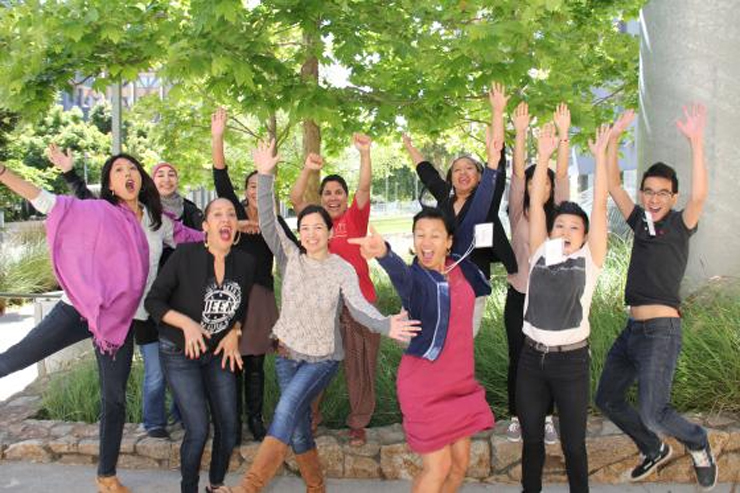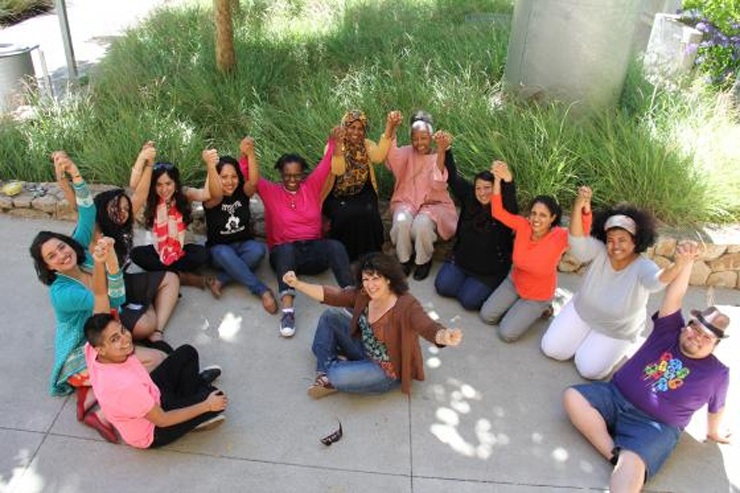
Evelina Galang with VONA/Voices students last year.
Many writers, who belong to various minority racial and/or ethnic groups, have felt silenced in workshops where their cultural expressions have not been traditionally embraced. In 1999, a group of writers tired of such workshops founded the Voices of our Nations Arts Foundation (VONA).
The foundation hosts the only multi-genre workshop for “writers of color” in the country, VONA/Voices, which welcomes them to express issues of race, ethnicity and diaspora.
The co-founders of the flavor-filled, creative workshop include Dominican-American Pulitzer Prize winner Junot Díaz. He wrote about his difficult M.F.A. workshop experience at “too white” Cornell in the notorious New Yorker article “POC (Person of Color) vs MFA (Master of Fine Arts).”
Victor Diaz, Elmaz Abinader, and Diem Jones were also co-founders. They began the workshop at the University of San Francisco; it then moved to the University of California at Berkeley. Now, VONA/Voices has migrated from the Bay Area after fifteen years to the University of Miami’s College of Arts and Sciences.
I had a chance to ask a few questions to Evelina M. Galang, Director of the Creative Writing Program at UM, writer, and VONA board member, and Elmaz Abinader, writer, poet, and co-founder about “writers of color,” the VONA/Voices program, and its move to Miami. Here’s what they had to say:
Interview with Elmaz Abinader, co-founder of VONA/Voices:
What urged the founding of VONA/Voices? How did it come to be? What led to the creation of a "writers of color" workshop?
When the VONA/Voices workshop was founded in 1999, by myself, Diem Jones, Junot Díaz and Victor Diaz, we learned that only two percent of writers in writing workshops were writers-of-color. In addition, then and continuing to today, writers-of-color, who do attend the workshops often deal with marginalization, exoticization, and struggles with having an equal and fair reading of their work. In many cases, they report antagonistic responses to their language, politics, content and form. In this atmosphere the writer doesn’t receive the deep and profound examination of the work that allows them to evolve as writers.
In developing VONA/Voices, we create a space that doesn’t question identity, language or topic, but looks at the work with passion and acceptance, giving the writers the needed guidance to develop and grow.
How is someone considered a "writer of color"?
We actually have an official description: Writer of color refers to a non-European, non white, writer whose people have been colonized, enslaved, displaced or who have immigrated and are part of underserved and underrepresented communities.
People of color often originate from indigenous nations, had ancestors in slavery, are immigrants from Africa, South and East Asia, Middle East, South and Central America and most island peoples who are native and under a colonial rule.
European/American and most former or present Empires do not belong in this category. This is a distinction between the colonizer and the colonized and the people in the diaspora.
How do "writers of color" benefit from an exclusive workshop?
When writers-of-color come into our space where they are not conscious of their identity or they aren’t dealing with “differences” before development, they have greater opportunities to talk about their work—not only the craft and the art of it, but also how it is a contribution to the voices of literature, how it talks to history and to culture, how it inhabits the silences that have been suppressed by the marketplace and by the established literary world.
They find a community who shares their narratives and their concerns, they encounter established writers through the faculty who guide them to becoming writers or furthering their pursuit as writers, they find allies and compadres who become their writing world and circle who they reach out to in times of doubt and challenge. We have frank talks in the workshops about the publishing industry, our challenges, our legacies and our futures.
Are there are any drawbacks to the “writers of color” workshops?
There are no drawbacks except we don’t reach enough silences, we don’t have enough time, we can’t make it free so everyone can come who needs to. Mainstream writers have the entire literary establishment supporting them. (Click here for a story that addresses this issue). Writers of color have a handful of workshops to support them. It’s an uphill battle.
What would you say to those that feel the term "writers of color" is derogatory and groups various ethnic and racial minorities together, further marginalizing them?
I’m not concerned with the critics of our program or our language. We live in a very destructive time where the divide and conquer ethic is strong, where our people, especially African Americans are targeted, where the stereotypes of our people are very often the only stories people want to hear.
If a Chinese American writer and a Latina writer can relate to the harsh realities of being writers in this aggressive and malicious time, then we win. We haven’t further marginalized our writers they have published (over 200 books), they have entered MFA programs, they have created literary magazines and anthologies, they are on stages reading, they have quit jobs to work on their writing; they are teaching in the universities, they are presenting at conferences; they are shaking it up. Yes, I can see why there would be critics.
What do you feel has been the greatest success of the program in the past fifteen years?
I could point to a lot of individual achievements. Just two days ago, Adriana Es Ramirez, our alum and a member of our team won the PEN Emerging Writer award. I could point to alums like Tayari Jones, Laila Lalami, Derrick Weston Brown, but each individual achievement comes with more than the support of VONA/Voices, so we claim a contribution only. Our best success is managing to push our presence, make us a force, and growing in leaps and bounds. We started with 25 applicants in 1999 this year almost 700.
How would you like to see the program grow in this new chapter, relocating to a multi-cultural hub such as Miami?
We are thrilled to be in Miami, and at the University of Miami where the College of Arts and Sciences has embraced us. The MFA program in Creative Writing is one of the most diverse in the country and has graduated impressive writers (most recently Daisy Hernandez) who find support it the program.
Miami is the perfect location in its confluence of diasporic and first nations writers and its famous literary legacy. We hope to be identified with this well spring of Miami’s literary offerings and like the Miami Book Fair, help design the cultural landscape here.
But we don’t limit ourselves to Miami, we are planning on six regional workshops in the upcoming year throughout the country that will be 3-4 day intensives working with writers-of-colors in specific areas and on narratives that relate to their regions.
Interview with Evelina M. Galang, VONA board member, director of the Creative Writing Program at UM.

Elmaz Abinader with her students.
How did you get involved with VONA?
I was invited to teach the residency in 2009. My experience working with writers of color was exhilarating. As an emerging writer, I had never worked with mentors of color. I saw it as an opportunity to create positive change in the world, to support underrepresented writers who are often discouraged in school or in the world of publishing, or even in their working class families where writing is seen as hobby rather than work. I got so involved with VONA/Voices, I joined the board. I’ve been teaching at VONA every year since.
Who are "writers of color"?
For me, writers of color are those writers of non-European descent, who come from traditionally marginalized communities and whose histories have undergone systematic oppression, colonization, racism and for some, slavery. They are the writers in a workshop who see the world and the way it works differently from the perspective of the dominant culture because of these similar and shared experiences. In most writing workshops, they are often misunderstood by their peers and even their teachers. In the case of Asian American and Filipino American writers, we are too often seen as forever foreigners (despite our American nationalities). Generally speaking, writers of color are those of African, Asian, East and Southeast Asian, Latin American and Native American descent.
What is the benefit of a workshop exclusive to "writers of color"?
When I was in graduate school, I was the only woman of color in the workshop. What did that mean? It meant that stories I was interested in telling narratives of race, culture, gender, or identity were of no interest to my peers, and so the point of the story was often lost. Or the very issues became a huge distraction for my readers and rather than talking about craft plot, character development, point of view my workshop spent the hour feeling personally offended. Or they politely accepted whatever I wrote because they did not want to get into “it.” What it often meant was my work did not get the rigorous attention it needed. I never had the opportunity offered by VONA a chance to workshop fiction in a safe place, where issues of race, culture, identity, gender, and sexual orientation do not distract and are not on attack, but are a part of the fabric of the workshop. Craft can be the center of attention.
Writers’ intentions are intuitively understood, and if those intentions are not met, writers will make suggestions to help meet them. That is not to say conflict and misunderstanding are never a part of workshop, but writers can feel safe about exploring the issues they want to explore and know that the work will be seen with a critical eye toward craft.
What led to VONA's move from the Bay Area to Miami after fifteen years?
When the VONA board began discussing the possibilitiy of moving the workshop, I thought about my own program here at the University of Miami. As the director of the MFA in Creative Writing Program at UM as well as a VONA/Voices Board member, I knew UM and VONA would be a great fit. Our creative writing faculty are among the most diverse anywhere in the country. We are situated in an international city, at the edge of the Caribbean and Latin America, where attitudes toward diversity are varied and unique.
At UM we had hosted a few weekend workshops and had a strong sense of shared mission with VONA. So I talked with the deans of the College of Arts and Science, Leonidas Bachas, and Maria Stampino, as well as Pamela Hammons. the chair of English. The dean’s office agreed that we share with VONA/Voices a commitment to diversity, the emerging writer and his or her role in documenting the voices of the unheard, and the cultivation of writers with potential to produce important books. From there, we began our conversation with the VONA/Voices leadership.
What is the benefit of relocating to the multicultural hub of Miami?
Miami is like no other city. There is a tolerance and a generosity to persons who come from outside of mainstream America. We also have a perspective on diversity that is unique and different than most cities and perhaps even to VONA/Voices. I think that for writers of VONA/Voices there will be a new layer of understanding and challenge as we encourage writers and poets to write their stories. Miami’s vibe is totally different than the Bay Area’s and so there are ways this will shift the program and make it grow.
For the University of Miami and our community here, having the presence of some of the country’s most noted writers of color Junot Diaz, Staceyann Chin, Faith Adiele, David Mura and others gives not only our participants but our community access to some of the best writing and reading happening in contemporary U.S. literature. A partnership between the university and VONA/Voices reaffirms our shared vision and commitment to nurturing emerging writers in a rigorous and safe writing community. I think everyone benefits from this move. And, it makes me happy as an artist, a mentor and a program director.
What would you say to those who find the phrase "writers of color" or, in this regard, "people of color" a derogatory label that marginalizes various ethnic minorities?
First of all, that’s news to me. What is derogatory about claiming our identity? I am a woman of color. I am Asian American. I am Filipina American. And nearly all my life, I have been that woman or girl in a predominantly white community. We are historically marginalized. We are under read and underrepresented. We are not only “writers of color” because of the color of our skin, but because our perspective which is culturally, socially, and oftentimes economically different than the dominant mainstream culture we are often times not always misunderstood by our white counterparts.
What is derogatory is when various ethnic minorities are invisible and are told “I always think of you as white.” That means our culture, our communities and our experiences are not being recognized. And on the flip side, what is derogatory is the assumption that we are never really a part of this nation, rather that we are eternally foreign.
This is why writing our stories is important. Why it’s important to have safe places to work on them. It gives writers and poets a kind of strength to deal with what’s out there and to develop their inner writer.
At the same time, I got to say, everybody sees the world in his or her own way. You have to call it like you see it, for yourself and no one else. So if people of color are out there and they don’t want to be identified as such, that’s up to them. If they have a problem with that, well, then, they do. But I am not white. And to date, I am still living in a world where I am a minority. And when I look in the mirror, I see a woman of color. I am a writer of color.
Occurring during two weeks in the summer, the workshop brings together a diverse group of students and teachers for daily workshops in fiction, poetry, memoir, travel writing, and playwriting. Well-known “writers of color” such as Jeffrey Renard Allen, Mat Johnson, Christina Garcia, Chris Abani, David Mura, and Junot Diaz, among others, have taught workshops. Likewise, VONA/Voices has contributed to the success of writers such as Tayari Jones, Maaza Mengiste, Deborah Santana, and Laila Lalami.
Along with daily workshops, faculty readings hosted by Books and Books will be held on Thursdays of the VONA weeks. On June 25, at 7pm at the Coral Gables Congregational Church, Pulitzer Prize winner and MacArthur Genius grant recipient Junot Diaz will headline the VONA faculty reading. On July 2 at 7 p.m., a faculty reading at Books and Books Coral Gables will feature Faith Adiele, Chris Abani, Tananarive Due, Evelina Galang, Achy Obejas, Willie Perdomo and Andrew X. Pham.
For more information visit voicesatvona.org.




